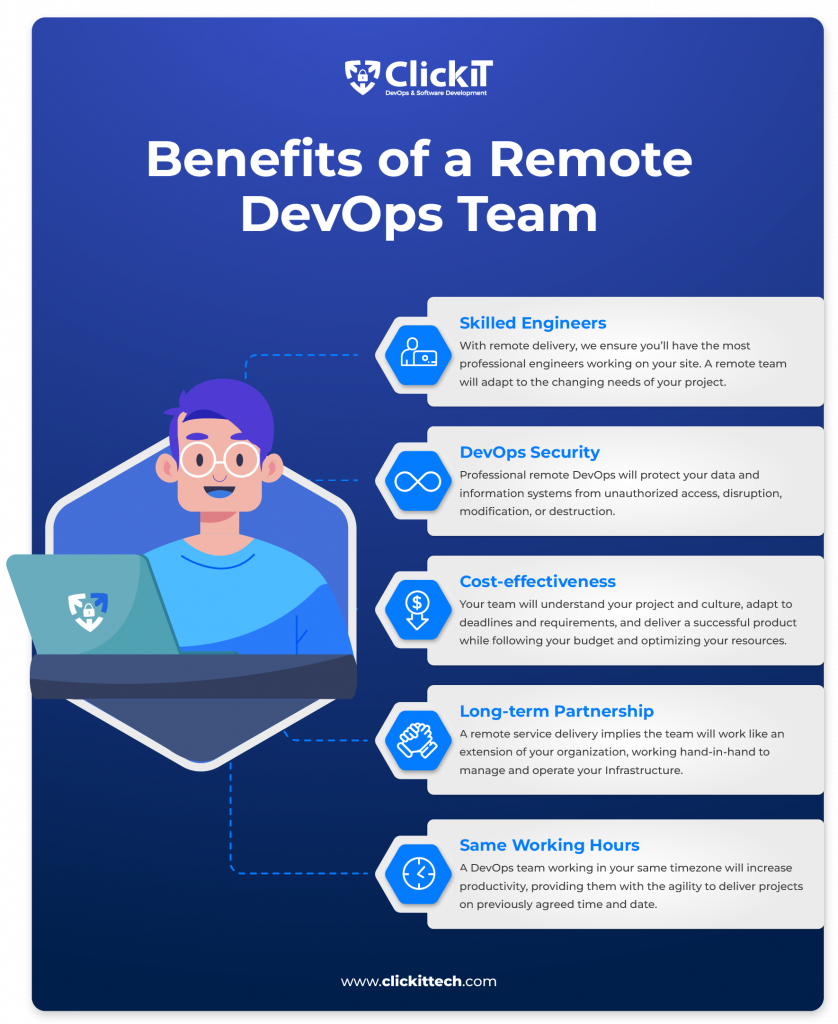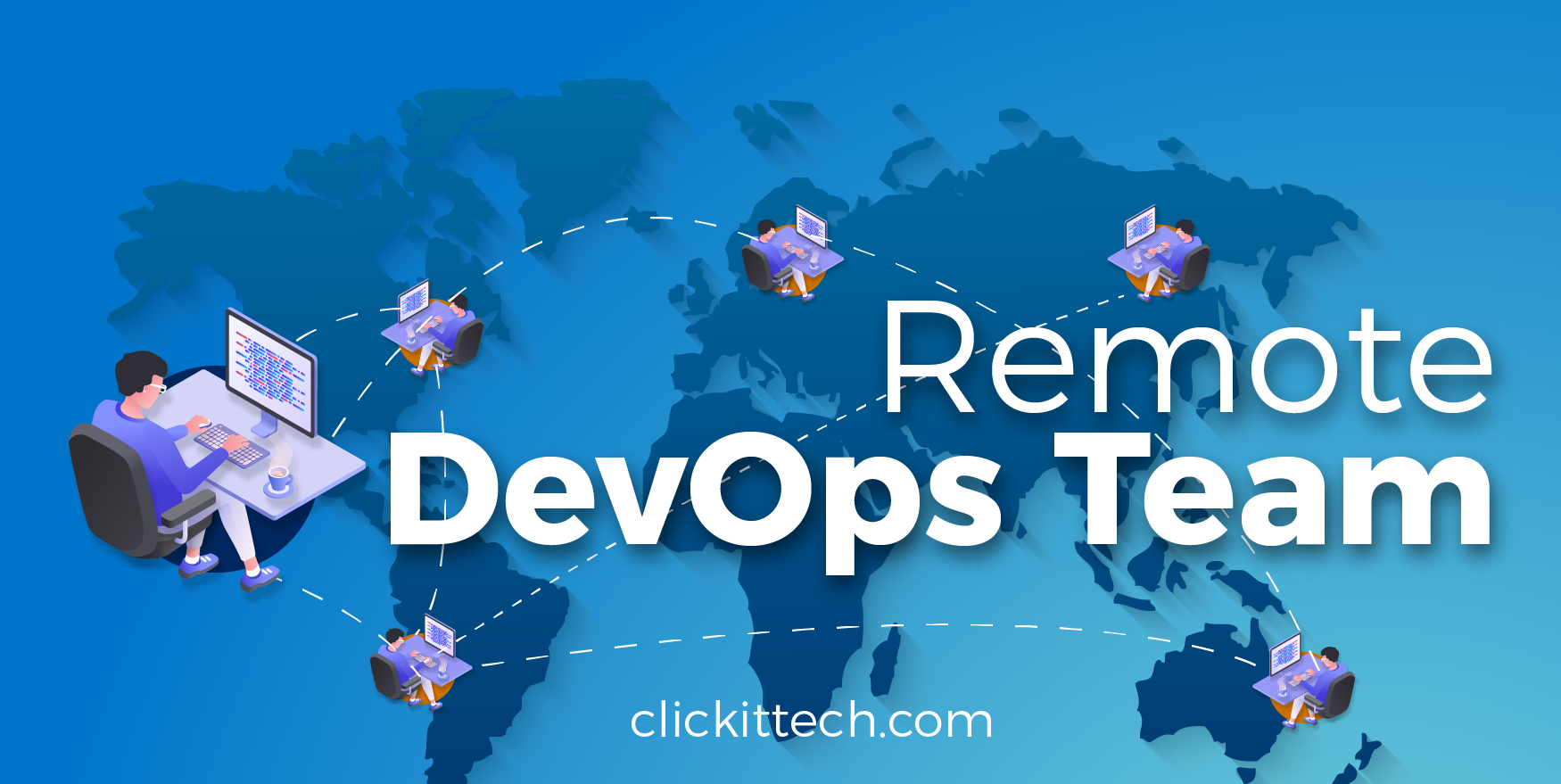Having a Remote DevOps team means following a consultancy practice that goes in a different direction compared to traditional processes. DevOps and remote work adopt Agile practices that can benefit companies of all sizes.
What are the benefits of remote DevOps? Let’s dive into it.
Table of contents
- Remote DevOps team
- Skilled Engineers Availability
- Remote work at the right time
- Cost-effectiveness
- DevOps Security
- Long-term Relationship
- Team Collaboration
- To sum up about Remote DevOps
Remote DevOps team
When an enterprise is working hand-to-hand with a Remote DevOps team, business’s expenses can be considerably optimized and, as a consequence, help you to save costs. These are some of the business benefits of having a Remote DevOps Team:
- Skilled Experts
- Cost-effective
- DevOps Security
- Long-term relationship
- Team Collaboration
Skilled Engineers Availability
Working with a remote DevOps team implies your enterprise working with the most prepared people on the field, regardless of their location, at the time of saving traveling costs. With remote delivery, we ensure you’ll have the most professional engineers working on your site. Even if the project takes a twist, a remote team can move people in and out of it depending on the new skills required.
A business must find the right talent. Remote work on DevOps exponentially increases worker productivity and efficiency. A benefit for both employers and employees: It helps to lower stress and distractions, leading work to higher efficiency in the cloud world.
Watch our video, where we explain how communication is important in DevOps and software development.
Remote work at the right time
Let’s talk about work time and availability; companies that need a remote team in the same time zone, can benefit from a nearshore team. There’s no need to be in the same office, city, or even country to find the best skills on the market for remote DevOps.
The same time zone offers employees the agility to work as efficiently as required, delivering projects on previously agreed time and date. A DevOps team in the same time zone is more productive, and every organization deserves to obtain the best out of it.
Cost-effectiveness
Working with remote DevOps can help reduce overhead costs that come with hiring an in-house team. Plus, a remote DevOps team will have the right tech expertise and soft skills to understand your project and culture, adapt to deadlines and requirements, and deliver a successful product while following your budget and optimizing your resources.
At ClickIT, we are a nearshore remote team mainly focused on the quality of delivery, skills, and expertise. We have decided that companies should pay for skills and not for traveling costs. Skipping those downtimes that inevitably occur while traveling means that the remote team can focus more time and effort on the enterprise, on every goal, and ensuring every task will be delivered on time.
Remote DevOps Security
Companies are continuously worried about security within their team and working with remote DevOps can be a common concern. Remote DevOps work with modern cloud environments, ensuring safety from the foundation of each project until delivery. They build secure and agile environments for our customer and their own.
Regarding information security, professional remote DevOps will protect your data and information systems from unauthorized access, disruption, modification, or destruction. Access can also be restricted so that remote teams can only work on the tasks assigned to them and not have complete access over the server and cloud services.

Long-term Relationship
Specific businesses deserve defined goals and a long-lasting relationship; that’s why our remote team specifies predefined goals to customers. Outsourcing a remote service delivery implies the team will support Agile and DevOps best practices and will work hand-in-hand with customers to manage and operate their AWS DevOps Infrastructure.
A delivery DeVOps team is like an extension of your organization. The culture in ClickIT is based on dynamism, and we are aware that our clients have their own work culture, so we are flexible to integrate our culture into theirs. We like to operate with a work-culture integration, highlighting the importance of team communication. Moreover, our team of engineers is continuously learning new technologies and cloud services to deliver the best support to each client in the short- and long term. This can be achieved remotely with the help of eLearning platforms.

Team Collaboration
Team Collaboration is on the rise with us! ClickIT always seeks the best tools to communicate and collaborate with clients. We like to keep the communication channel open and available for real-time meetings and updates on projects. For messaging, video calls, and management tasks, we can use any app or tool, such as Slack, Microsoft Teams, Zoom, Teamwork, Skype, Hangouts, JIRA, Trello, Asana, or any other that the client decides.
To sum up, Remote DevOps
A Remote DevOps Team is a multidisciplinary team of specialists working all together on iterations to provide instantaneous feedback and avoid delays and extra costs on the infrastructure and development. It provides value and talent to your project, while ensuring collaboration, security and optimized resources. Let our team of experts deal with your infrastructure; we are ready to help you grow.

Remote DevOps FAQs
DevOps combines software development (Dev) and operations (Ops) to enhance collaboration and productivity. In remote work, DevOps becomes crucial for ensuring seamless communication and cooperation among teams. Tools like version control, continuous integration, and automated testing help streamline workflows, allowing remote DevOps teams to work efficiently and deliver high-quality software.
Following secure coding practices, incorporating infrastructure as code (IaC), and implementing robust access controls are essential. Additionally, regular audits and monitoring, combined with the use of encryption and secure communication channels, help maintain a secure environment. Adhering to industry standards and regulations ensures that remote DevOps activities remain compliant with relevant guidelines.
Tools like Git for version control, Jenkins or GitLab CI for continuous integration, Docker for containerization, and Kubernetes for orchestration are important for DevOps and remote work. Communication tools like Slack or Microsoft Teams facilitate real-time discussions, while project management tools such as Jira or Asana help in coordinating tasks.









